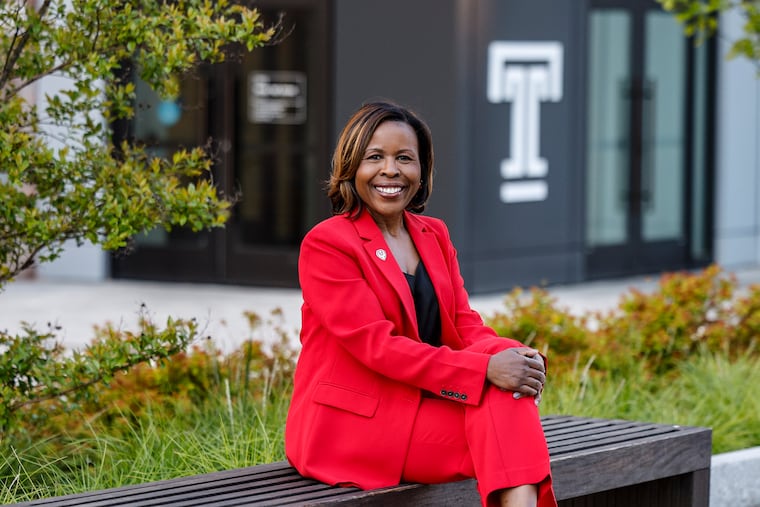Philly deserves better schools. Temple is all in.
Temple's new master’s degree in urban education and policy at the College of Education and Human Development is dedicated to boosting district schools and setting a model for other cities to follow.

If you have been paying attention in the nearly two years since Tony B. Watlington Sr. was appointed superintendent of the School District of Philadelphia, you have likely noticed a theme whenever he speaks. He’s been consistent, and his goal and vision are clear: He seeks to elevate the district so it can become, in his words, “the fastest-improving large, urban school district in the country.”
It’s an ambitious goal. It’s an admirable goal, too.
But it’s also a goal that cannot be accomplished alone. That is where Temple University and the College of Education and Human Development come in.
Last July, I began my tenure as dean of the college after spending most of my career at institutions in other major urban areas such as Miami, Milwaukee, and Kansas City, Mo.
I did not come to Temple — or Philadelphia — because I expected things would be easy.
I came because I knew it would be hard. And for someone who has built a career around urban education, I also knew there was nowhere better for me to be.
» READ MORE: Promises of equity for Philly’s schools aren’t worth as much as actual money | Opinion
My familiarity with Temple did not come from its basketball legacy, or from the celebrities whose careers it launched. It came from the institution’s commitment to urban education — and, more specifically, from the alumni, who are leaders in urban education across the country. Leaders like the late Constance E. Clayton, both the first woman and the first African American to serve as superintendent of the School District of Philadelphia, and now the namesake of the school district’s headquarters.
At our college, our mission, vision, and values are rooted in urban education. Our goal is to produce students who promote equity in both classrooms and communities. We are going back to our roots to chart a new course that will lay the groundwork to bring about lasting change in urban education.
So, here’s my pledge to Philadelphia, and to its public schools: At Temple, we are all in.
We know it will be hard, and the stakes are high. Philly’s more than 300 schools teach nearly 200,000 kids, but they are ranked near the bottom in a national assessment of 26 big-city districts in 2022. An ongoing teacher shortage compounds the problem because we cannot find educators to help right the ship. Due to a 70% drop in teacher licenses between 2011 and 2022, the commonwealth issued its lowest-ever number of new teaching certificates in 2021-2022.
We know it will be hard.
This is not sustainable, and as dean, it is my responsibility to ensure we are doing everything we can to fill these gaps.
Since taking on this role, I have made more than 50 visits to K-12 schools in and around the Greater Philadelphia region. To really understand the dynamics of our K-12 educational environment, it was important for me to experience it firsthand. After all, as a university and as a college, how can we fulfill our mission if we are not supporting the diamonds in our very own backyard?
This is how we are going to start:
This fall, we are launching a new master’s degree in urban education and policy. It’s a program that was once a hallmark of our college, but it has been redesigned, and can now be completed in two years on a part-time basis. By making the program more accessible, we believe it will help create and sustain networks of teachers, education researchers, and school leaders who have the skills and knowledge to help urban students and communities reach their full potential.
To expand access to teacher education, the Delta Sigma Theta Sorority Inc., Philadelphia Alumnae Chapter, recently donated $50,000 to fund a scholarship named for Clayton, which will provide financial aid for graduates of the School District of Philadelphia to attend the College of Education and Human Development. We have also recognized Clayton’s legacy by creating an urban education leadership award that bears her name and will honor some of the best and brightest thinkers in the field.
But there is much more to do. Over the last several months, I have been meeting with Superintendent Watlington, my fellow education deans in the city, and community partners to further identify ways in which we can help raise our city’s profile.
Philadelphia’s situation is distinctive, and there are several challenges. But it is not hopeless. We have an opportunity to be a model for how to improve urban schools across the country, and the work we do can serve as the blueprint for other areas to follow. We can show the nation what can be accomplished when faculty, administrators, colleges of education, and community partners work together to transform urban schools. So let the hard work begin.
Monika Williams Shealey is dean of Temple University’s College of Education and Human Development, and the first female dean in the college’s 105-year history.